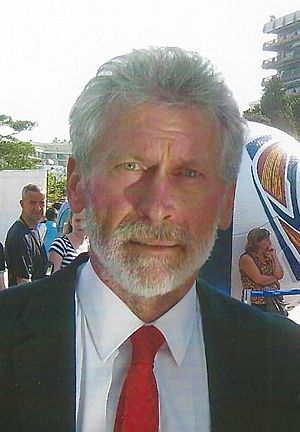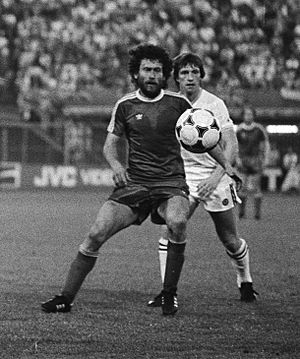Paul Breitner facts for kids

Breitner in 2011
|
|||||||||||||||||||||||||
| Personal information | |||||||||||||||||||||||||
|---|---|---|---|---|---|---|---|---|---|---|---|---|---|---|---|---|---|---|---|---|---|---|---|---|---|
| Date of birth | 5 September 1951 | ||||||||||||||||||||||||
| Place of birth | Kolbermoor, Bavaria, West Germany | ||||||||||||||||||||||||
| Height | 1.76 m (5 ft 9 in) | ||||||||||||||||||||||||
| Position(s) | Left-back, midfielder | ||||||||||||||||||||||||
| Youth career | |||||||||||||||||||||||||
| 1957–1961 | SV-DJK Kolbermoor | ||||||||||||||||||||||||
| 1961–1970 | ESV Freilassing | ||||||||||||||||||||||||
| Senior career* | |||||||||||||||||||||||||
| Years | Team | Apps | (Gls) | ||||||||||||||||||||||
| 1970–1974 | Bayern Munich | 109 | (17) | ||||||||||||||||||||||
| 1974–1977 | Real Madrid | 84 | (10) | ||||||||||||||||||||||
| 1977–1978 | Eintracht Braunschweig | 30 | (10) | ||||||||||||||||||||||
| 1978–1983 | Bayern Munich | 146 | (66) | ||||||||||||||||||||||
| Total | 369 | (103) | |||||||||||||||||||||||
| International career | |||||||||||||||||||||||||
| 1968–1970 | West Germany Youth | 16 | (1) | ||||||||||||||||||||||
| 1971 | West Germany U-23 | 1 | (0) | ||||||||||||||||||||||
| 1971–1982 | West Germany | 48 | (10) | ||||||||||||||||||||||
|
Medal record
|
|||||||||||||||||||||||||
| *Club domestic league appearances and goals | |||||||||||||||||||||||||
Paul Breitner (born 5 September 1951) is a famous German former footballer. He played as a midfielder and left-back. Many people think he is one of the best players of his time. He was even named in the FIFA World Cup All-Time Team. In 2004, he was chosen as one of the Top 125 greatest living footballers by FIFA.
Breitner played 48 games for West Germany. He was a key player when the team won the 1974 FIFA World Cup. He even scored a goal in the final match.
He also scored in the final of the 1982 FIFA World Cup. This makes him one of only five players to score in two different World Cup finals. The others are Pelé, Vavá, Zinedine Zidane, and Kylian Mbappé.
He was well-known for his strong partnerships with other players. In defense for the national team, he played alongside Franz Beckenbauer, Hans-Georg Schwarzenbeck, and Berti Vogts. For Bayern Munich, he formed a great midfield team with Karl-Heinz Rummenigge.
After he stopped playing, Breitner became a commentator, expert, and writer in Germany. He also works as an advisor for the Bayern Munich management team.
Contents
Paul Breitner's Football Journey
Early Career and Key Roles
Paul Breitner's football career started in 1970 and ended in 1983. He mostly played for Bayern Munich from 1970 to 1974 and again from 1978 to 1983. He also played for Real Madrid from 1974 to 1977. For one season, he played for Eintracht Braunschweig.
When he first started, he was a left-back who could move all over the field. He was good at both scoring goals and stopping opponents. Later in his career, he moved to the midfield. He became one of the best midfielders in the early 1980s.
Winning Big Tournaments
Breitner had a very successful career. When he was just 21, in 1972, he helped Germany win the European Championship. Two years later, he won the 1974 FIFA World Cup. The World Cup final was played in Munich against the Netherlands. Breitner scored Germany's first goal from a penalty kick.
In that final match, he, Franz Beckenbauer, Hans-Georg Schwarzenbeck, and Berti Vogts created a very strong defense. They stopped the Dutch team from getting many chances to score.
After the World Cup, he moved to Real Madrid. He left the West German squad for a while. He returned to the national team in 1981.

Club Success and Famous Partnerships
During his time playing for clubs, Breitner won many championships. He won seven National Championships with Bayern Munich (1972, 1973, 1974, 1980, 1981) and Real Madrid (1975, 1976). He also won the Champions' Cup in 1974. Additionally, he won the German Cup (1971, 1982) and the Spanish Cup (1975).
When he was at Bayern Munich, he and Karl-Heinz Rummenigge were an amazing duo. They were so good together that people often called them Breitnigge.
Paul Breitner's Views and Public Image
Expressing Strong Opinions
Outside of football, Paul Breitner was known for having strong opinions. He was part of a movement in the late 1960s that encouraged people to question things. He often spoke out about important social and political issues. This was especially true when Germany was still divided by the Berlin Wall.
Some traditional football fans did not like his strong views. They thought he was too radical. At one point, he was seen with a book by a Chinese leader named Mao Zedong. This made some people mistakenly label him as a Maoist. However, Breitner later said he never called himself a Maoist. He explained that he was just talking about different political ideas.
Changes and Endorsements
After 1974, Breitner's public image changed. He decided to play for Real Madrid, even though some people thought it was controversial. He also became known for spending a lot on houses and cars. He took part in many advertisements.
Before the 1982 World Cup, he caused a big stir in West Germany. He accepted a large sum of money from a cosmetics company to shave off his beard and advertise their aftershave. This was seen as a very high amount of money at the time. Breitner said that he was wrongly labeled as a Maoist after discussing communism with a journalist. He stated that he had nothing to regret because he never declared himself a Maoist.
Life After Football
Brief Coaching Role
In 1998, Paul Breitner was announced as the new manager for the national team. This was by the DFB president, Egidius Braun. However, after other officials reacted, Braun changed his mind just 17 hours later. This made Breitner famously known as the "17-hour coach."
Current Work
Today, Breitner mostly works as a TV expert and writes columns for newspapers. In March 2007, he started working with Bayern Munich again. He acts as an advisor on different topics for the club. He also sometimes plays for the Bayern All-Stars team in charity games. He has been the captain for the team many times.
Career Statistics
| Club | Season | League | National Cup | Europe | Total | |||||
|---|---|---|---|---|---|---|---|---|---|---|
| Division | Apps | Goals | Apps | Goals | Apps | Goals | Apps | Goals | ||
| Bayern Munich | 1969–70 | Bundesliga | – | 1 | 0 | – | 1 | 0 | ||
| 1970–71 | 21 | 2 | 5 | 0 | 4 | 0 | 30 | 2 | ||
| 1971–72 | 30 | 4 | 6 | 0 | 8 | 1 | 44 | 5 | ||
| 1972–73 | 32 | 4 | 6 | 1 | 5 | 0 | 43 | 5 | ||
| 1973–74 | 26 | 7 | 4 | 1 | 7 | 1 | 37 | 9 | ||
| Total | 109 | 17 | 22 | 2 | 24 | 2 | 155 | 21 | ||
| Real Madrid | 1974–75 | La Liga | 29 | 3 | 6 | 0 | 35 | 3 | ||
| 1975–76 | 25 | 6 | 7 | 0 | 32 | 6 | ||||
| 1976–77 | 30 | 1 | 3 | 0 | 33 | 1 | ||||
| Total | 84 | 10 | 16 | 0 | 100 | 10 | ||||
| Eintracht Braunschweig | 1977–78 | Bundesliga | 30 | 10 | 2 | 0 | 5 | 1 | 37 | 11 |
| Bayern Munich | 1978–79 | Bundesliga | 33 | 12 | 2 | 1 | – | 35 | 13 | |
| 1979–80 | 32 | 10 | 3 | 2 | 10 | 4 | 45 | 16 | ||
| 1980–81 | 30 | 17 | 2 | 0 | 8 | 1 | 40 | 18 | ||
| 1981–82 | 29 | 18 | 6 | 5 | 7 | 5 | 42 | 28 | ||
| 1982–83 | 22 | 9 | 2 | 1 | 6 | 3 | 30 | 13 | ||
| Total | 146 | 66 | 15 | 9 | 31 | 13 | 182 | 84 | ||
| Career total | 369 | 103 | 39 | 11 | 76 | 16 | 484 | 130 | ||
Awards and Achievements
Club Honours
Bayern Munich
- Bundesliga: 1971–72, 1972–73, 1973–74, 1979–80, 1980–81
- DFB-Pokal: 1970–71, 1981–82
- European Cup: 1973–74; runner-up: 1981–82
Real Madrid
- La Liga: 1974–75, 1975–76
- Copa del Rey: 1974–75
International Honours
West Germany
- FIFA World Cup: 1974; runner-up: 1982
- UEFA European Championship: 1972
Individual Awards
- kicker Bundesliga Team of the Season: 1971–72, 1972–73, 1978–79, 1979–80, 1980–81, 1981–82, 1982–83
- UEFA European Championship Team of the Tournament: 1972
- FIFA World Cup All-Star Team: 1974
- FUWO European Team of the Season: 1972
- World XI: 1972, 1974, 1975, 1976
- Sport Ideal European XI: 1972, 1974, 1979
- Footballer of the Year (Germany): 1981
- Ballon d'Or runner-up: 1981
- Onze d'Argent: 1981
- FIFA World Cup All-Time Team
- FIFA 100
- Bayern Munich All-time XI
- Ballon d'Or Dream Team (bronze): 2020
See also
 In Spanish: Paul Breitner para niños
In Spanish: Paul Breitner para niños
 | William L. Dawson |
 | W. E. B. Du Bois |
 | Harry Belafonte |

